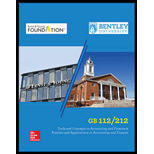
Inferring Information from the DuPont Model Ratios
LO13-5 in this chapter, we discussed the DuPont model. Using that framework, find the missing amount in each of the following cases:
Case 1: ROE is 10 percent; net income is $200,000; the total asset turnover ratio is 5; and net sales are $1,000,000. What is the amount of average stockholders’ equity?
Case 2: Net income is $1,500,000; net sales are $8,000,000; average stockholders’ equity is $12,000,000; ROE is 22 percent; and the total asset turnover ratio is 8. What is the amount of average total assets?
Case 3: ROE is 15 percent; the net profit margin is 10 percent; the total asset turnover ratio is 5; and average total assets are $1,000,000. What is the amount of average stockholders’ equity?
Case 4: Net income is $500,000; ROE is 15 percent; the total asset turnover ratio is 5; net sales are $1,000,000; and financial leverage is 2. What is the amount of average total assets?
1.
Compute the amount of average stockholders’ equity using the DuPont model.
Explanation of Solution
DuPont model: It is a model which allows the analyst to analyse a company’s performance using ratios. This model uses the ratios that indicate the company performance. DuPont model equation is as follows:
Return on equity ratio: Rate of return on equity ratio is used to determine the relationship between the net income available for the common stockholders’ and the average common equity that is invested in the company.
Determine the amount of average stockholders’ equity.
Hence, the amount of average stockholders’ equity is $200,000.
2.
Compute the amount of average total assets using the DuPont model.
Explanation of Solution
DuPont model: It is a model which allows the analyst to analyse a company’s performance using ratios. This model uses the ratios that indicate the company performance. DuPont model equation is as follows:
Total Asset turnover: Total asset turnover is a ratio that measures the productive capacity of the total assets to generate the sales revenue for the company. Thus, it shows the relationship between the net sales and the average total assets.
Determine the amount of average total assets.
Hence, the amount of average total assets is $1,000,000.
3.
Compute the amount of average stockholders’ equity.
Explanation of Solution
DuPont model: It is a model which allows the analyst to analyse a company’s performance using ratios. This model uses the ratios that indicate the company performance. DuPont model equation is as follows:
Total Asset turnover: Total asset turnover is a ratio that measures the productive capacity of the total assets to generate the sales revenue for the company. Thus, it shows the relationship between the net sales and the average total assets.
Return on equity ratio: Rate of return on equity ratio is used to determine the relationship between the net income available for the common stockholders’ and the average common equity that is invested in the company.
Determine the amount of average stockholders’ equity.
Working Note:
Determine the amount of average asset turnover.
Determine the amount of net income.
Hence, the amount of average stockholders’ equity is $3,333,333.
4.
Compute the amount of average total assets using the DuPont model.
Explanation of Solution
DuPont model: It is a model which allows the analyst to analyse a company’s performance using ratios. This model uses the ratios that indicate the company performance. DuPont model equation is as follows:
Total Asset turnover: Total asset turnover is a ratio that measures the productive capacity of the total assets to generate the sales revenue for the company. Thus, it shows the relationship between the net sales and the average total assets.
Determine the amount of average total assets.
Hence, the amount of average total assets is $200,000.
Want to see more full solutions like this?
Chapter 13 Solutions
GB 112/212 MANAGERIAL ACC. W/ACCESS >C<
- Can you explain the correct approach to solve this general accounting question?arrow_forwardCameron Manufacturing's break-even point in sales is $1,875,000, and its variable expenses are 65% of sales. If the company lost $84,000 last year, what must have been the total sales?arrow_forward??!!!arrow_forward
 Cornerstones of Financial AccountingAccountingISBN:9781337690881Author:Jay Rich, Jeff JonesPublisher:Cengage Learning
Cornerstones of Financial AccountingAccountingISBN:9781337690881Author:Jay Rich, Jeff JonesPublisher:Cengage Learning Managerial Accounting: The Cornerstone of Busines...AccountingISBN:9781337115773Author:Maryanne M. Mowen, Don R. Hansen, Dan L. HeitgerPublisher:Cengage Learning
Managerial Accounting: The Cornerstone of Busines...AccountingISBN:9781337115773Author:Maryanne M. Mowen, Don R. Hansen, Dan L. HeitgerPublisher:Cengage Learning

